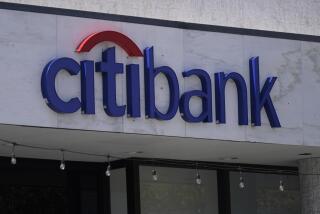Citigroup, FTC May Be Near Deal
- Share via
Addressing a potential barrier to Citigroup Inc.’s takeover of Golden State Bancorp, Citigroup’s top executive said Friday that the banking giant was “in advanced discussions” on settling a Federal Trade Commission lawsuit alleging sub-prime lending abuses.
FTC officials have insisted on a settlement worth hundreds of millions of dollars, topping the agency’s previous record in a predatory lending case set in March when Irvine lender First Alliance Corp. settled charges it cheated 18,000 home-equity borrowers. That settlement, up for final court approval next week, would yield $75 million for the borrowers, FTC attorney Anne M. McCormick said.
The FTC charges stem from practices at Associates First Capital Corp., once the nation’s largest sub-prime lender, which Citigroup acquired two years ago for $27 billion and merged with its own Citifinancial sub-prime unit.
The FTC contends the lender abused customers--mainly people with spotty or limited credit histories--by misleading them about high-interest debt-consolidation loans, charging unreasonably high fees, pushing costly mortgage insurance and using harassing collection tactics.
Consumer groups and some public officials have raised questions about Citigroup’s practices with banking regulators, who must approve its planned acquisition of San Francisco-based Golden State, the parent company of California Federal Bank and First Nationwide Mortgage Corp.
In a letter last week, California Treasurer Phil Angelides urged Federal Reserve Chairman Alan Greenspan to require the New York company “to make a significant and real commitment to all California neighborhoods.”
Citing concerns over “the appropriateness of Citifinancial’s sub-prime lending,” Angelides said that “well-respected community organizations” were complaining that Citigroup markets its best loans only to higher-income customers.
Citigroup spokeswoman Christina Pretto said the company has striven to clean up its sub-prime business and has committed $120 billion in loans and investments over 10 years to minority and lower-income customers in California and Nevada. Pretto said the Golden State transaction is “on track to close as planned” in the final quarter of this year.
At a presentation for analysts and investors Friday in New York, Citigroup Chief Executive Sanford I. Weill said the company was “in advanced discussions on settling” the FTC suit. Citigroup and FTC officials declined to describe the settlement under discussion. The Wall Street Journal, which first reported the development, said Citigroup will pay about $200 million to settle the FTC suit.
Weill also described Citigroup’s efforts to clean up its sub-prime business, which include:
* Discontinuing single-premium credit insurance on real estate loans, in which a single large payment added to the mortgage provides assurance the loan will be paid if the borrower dies or is disabled. The insurance typically expires after five years even if the loan isn’t paid off.
* Severing relationships with 5,000 brokers who had referred customers to Associates First Capital but didn’t meet Citigroup’s professional and ethical standards.
* Reducing rates on 200,000 sub-prime loans and “referring up” more than $47 million in loans to programs with better terms.
Weill discussed the firm’s sub-prime lending while making a wide-ranging defense of the numerous thorny issues facing his company. They include allegations of analyst conflicts of interest at Citigroup’s Salomon Smith Barney unit and improprieties in allocating shares of initial public offerings.
Citigroup’s liability for lawsuits over its role in high-profile corporate failures such as Enron Corp. and WorldCom Inc. may be as high as $10 billion, Prudential Securities analyst Michael Mayo estimated this week.
Citigroup shares rose 98 cents to $30.28 on the New York Stock Exchange. Despite a recent rally, the shares have fallen about 44% since peaking on Aug. 28, 2000, compared with a 13% decline by the Philadelphia/KBW index of the 24 largest U.S. banks and thrifts.
More to Read
Inside the business of entertainment
The Wide Shot brings you news, analysis and insights on everything from streaming wars to production — and what it all means for the future.
You may occasionally receive promotional content from the Los Angeles Times.











